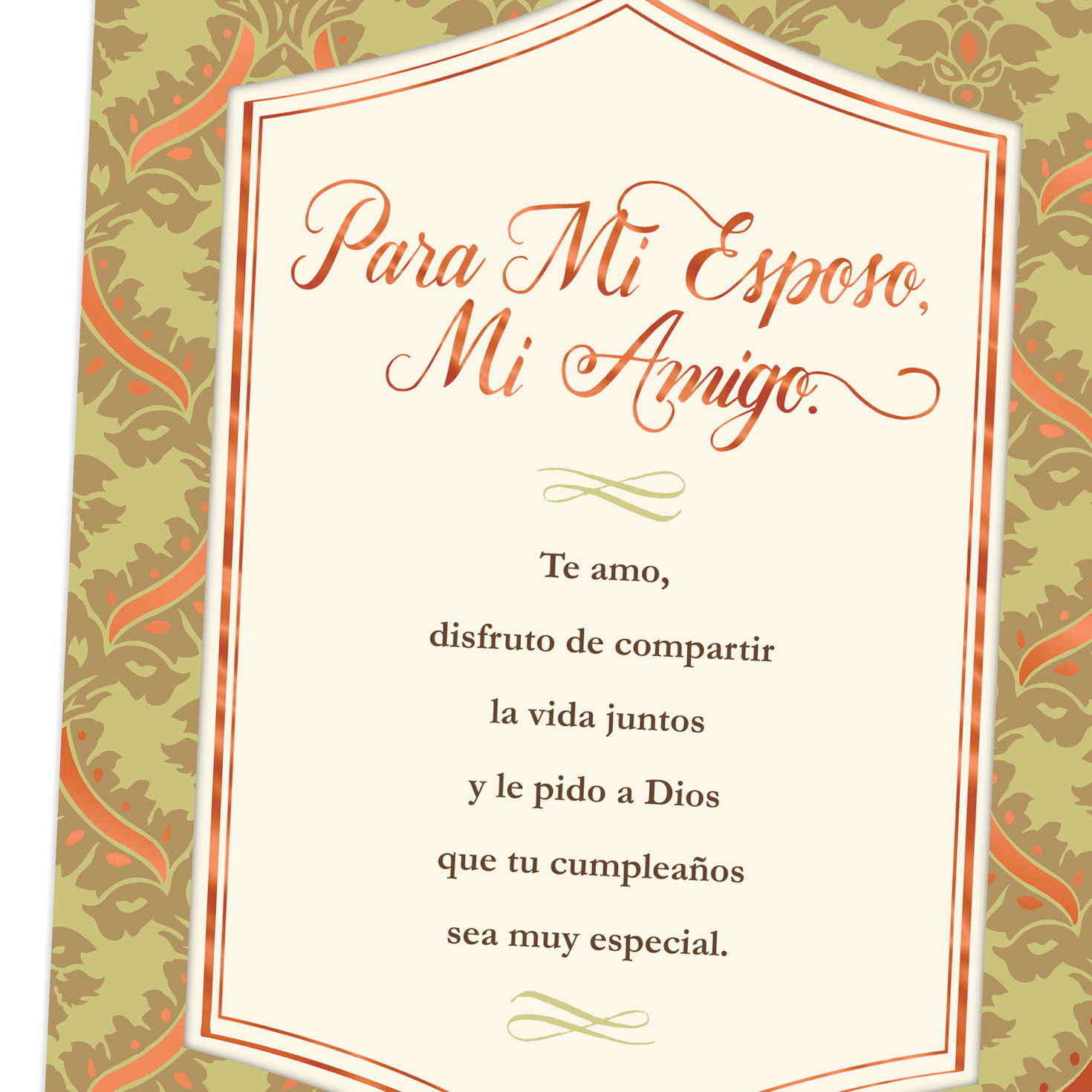Learning how to talk about your significant other in a new language can feel like a big step, and when it comes to Spanish, knowing how to say "husband" is truly a key piece of the puzzle. It's not just about a single word, you know, but about picking up on the different ways people express this important connection. Getting a handle on these terms really opens up conversations, letting you connect with folks who speak Spanish, and honestly, it helps you get a better feel for the culture itself.
There are, in fact, several ways you can express the idea of a husband in Spanish, and the one you pick often depends on how casual or formal you want to be, or even just where you happen to be speaking. Just like in English, where you might say "husband," "my man," or "my better half," Spanish has its own collection of words and affectionate phrases. Knowing these variations means you can speak with more confidence, more naturally, and frankly, just sound more like a native speaker, which is pretty cool.
This little guide will walk you through the most common ways to say "husband" in Spanish, from the everyday words you'll hear all the time to some sweet nicknames and even the more formal terms you might come across. We'll look at how context shapes your word choice, giving you a clearer picture of when and how to use each one. It's all about making your Spanish feel a bit more lived-in, so you can chat about your loved ones with ease and a genuine sense of connection.
- Jim Carrey Net Worth
- Do A Barrel Roll Barrel Roll
- Jolie Poirier
- Becca Bloom Husband
- Hailey Welch Nashville Tennessee
Table of Contents
- What's the main way to say husband in Spanish language?
- How do people actually say "my husband" in Spanish language?
- Are there other words for husband in Spanish language?
- What about terms of affection for your husband in Spanish language?
- Why learn different ways to say husband in Spanish language?
- What about husband and wife together in Spanish language?
- Are there formal ways to refer to a husband in Spanish language?
- A Quick Look at Saying Husband in Other Languages
- Key Takeaways for Husband in Spanish Language
What's the main way to say husband in Spanish language?
When you're trying to figure out the most common words for "husband" in Spanish, two words usually come up first: `esposo` and `marido`. Both of these are absolutely correct, and you'll hear them used all over the place. However, they do carry just a little bit of a different feel, which is interesting to think about. `Esposo` is, you know, often seen as the more common or perhaps slightly more modern choice in many Spanish-speaking areas. It feels quite neutral and can be used in almost any situation without sounding out of place.
`Marido`, on the other hand, is also perfectly good and very widely used, but it can sometimes have a slightly more traditional or perhaps even a little old-fashioned ring to it in some parts of the Spanish-speaking world. It's still totally understandable and correct, of course, but it's just a subtle difference in how it might be perceived. You might find that some people lean more towards `esposo` in everyday conversation, while others, particularly in certain regions or among older generations, might prefer `marido`. It really just depends, in a way, on the local custom and personal preference.
For example, you could say, "Mi esposo es muy amable," which means "My husband is very kind." Or, you might hear someone say, "Mi marido y yo vamos de vacaciones," meaning "My husband and I are going on vacation." Both sentences work perfectly well, and honestly, the choice between `esposo` and `marido` often comes down to what you hear most often where you are learning or practicing your Spanish. It's almost like choosing between "spouse" and "husband" in English; both are right, but one might feel a bit more natural in a particular setting, you know?
How do people actually say "my husband" in Spanish language?
Adding "my" to "husband" in Spanish is pretty straightforward, but it's a good way to start making your sentences feel more personal. You'll simply put `mi` before `esposo` or `marido`. So, you get `mi esposo` or `mi marido`. This is the most direct and common way to express that specific connection, and it's what you'll use in most everyday chats. For example, if you're introducing someone, you might say, "Te presento a mi esposo," which means "I'd like to introduce you to my husband." It’s quite simple, really.
The context really matters when you're using these phrases, just like your tone of voice can change the meaning of words in English. If you're talking about your husband in a casual chat with friends, `mi esposo` or `mi marido` are both totally fine. If you're filling out a form or talking in a more formal setting, these terms still hold up. The key is that `mi` clearly shows possession, making it very clear who you are talking about. It’s a pretty essential piece of vocabulary to get down, as a matter of fact, because it comes up so often.
You might hear someone say, "Mi marido es un gran cocinero," meaning "My husband is a great cook," or perhaps, "Mi esposo trabaja mucho," which translates to "My husband works a lot." These phrases are very common and, honestly, a fundamental part of talking about family connections in Spanish. They're simple, direct, and universally understood, which is nice. It's just a little bit of practice that makes them feel completely natural when you speak.
Are there other words for husband in Spanish language?
Beyond `esposo` and `marido`, there are indeed other words that can, in certain situations, hint at or even directly mean "husband," though they might not be direct translations in every case. One such word is `hombre`, which literally means "man." While you wouldn't typically use `hombre` on its own to mean "husband" in a formal sense, you might hear it in a more casual or affectionate way, like "mi hombre," which could translate to "my man" or "my guy," implying your husband or partner. It’s a bit like saying "my guy" in English, you know, it has that kind of feel.
Then there are the terms of endearment, which aren't direct translations but are definitely used to refer to a husband in a loving way. Think of phrases like `mi viejo` or `mi gordo`. Now, `viejo` literally means "old man," and `gordo` means "fat one," but these are used as very affectionate nicknames, similar to how someone might call their husband "honey" or "sweetheart" in English, completely without any negative meaning. They are, in some respects, terms that show a deep, comfortable closeness, and are often used within a couple or close family. It's actually quite common.
For more formal or legal settings, you might come across words like `consorte` or `cónyuge`. `Consorte` is a rather formal term for "spouse," and `cónyuge` is another very formal, gender-neutral word for "spouse." You wouldn't typically use these in everyday chat, but they are absolutely correct in official documents or very proper discussions. So, while they aren't the everyday words for "husband," they certainly exist and serve a purpose, particularly when formality is key, naturally.
What about terms of affection for your husband in Spanish language?
Spanish, like many languages, is rich with terms of endearment that people use for their loved ones, and these are absolutely used for husbands too. These words add a wonderful layer of warmth and closeness to your conversations. You'll often hear terms like `cariño`, `amor`, `vida`, and `corazón`. While these can be used for anyone you care deeply about – a child, a friend, or a partner – they are very, very commonly directed at a husband. For instance, `cariño` means "dear" or "darling," and it’s a very sweet way to address someone you love. It’s pretty much a staple.
`Amor` translates directly to "love" and is perhaps one of the most universal terms of affection. Calling your husband `amor` is a beautiful way to show deep feeling, and it’s heard everywhere. Then there's `vida`, which means "life." Calling someone `mi vida` – "my life" – is an incredibly powerful and intimate way to express how much they mean to you. Similarly, `corazón`, meaning "heart," is another popular choice, often used as `mi corazón` – "my heart." These terms, you know, really convey a lot of emotion without needing many other words.
You might hear someone say, "Buenos días, mi amor," to their husband in the morning, which is "Good morning, my love." Or, "Gracias, cariño, por tu ayuda," meaning "Thanks, dear, for your help." These expressions are not just for romantic movies; they are part of daily life for many Spanish speakers. They are, in some respects, a lovely way to keep the connection strong and show affection, making your conversations feel truly human and warm. It's actually a really nice part of the language.
Why learn different ways to say husband in Spanish language?
Learning the different ways to say "husband" in Spanish, beyond just one or two words, is honestly quite valuable for several reasons. For one thing, it helps you connect on a deeper level with native Spanish speakers. When you can pick up on the subtle differences in word choice, you show that you're not just memorizing vocabulary but actually getting a feel for the language's nuances. This can really make your conversations flow more naturally, too it's almost like you're speaking from the heart.
Knowing these variations also helps you understand what people are saying more completely. If someone uses `marido` instead of `esposo`, or a term of endearment like `mi viejo`, you'll grasp the full meaning and the feeling behind their words, rather than just the literal translation. This kind of deeper comprehension really improves your overall listening skills and helps you avoid misunderstandings. It’s pretty much essential for truly getting what's being communicated, you know.
Plus, using a variety of terms makes your own Spanish sound more natural and less like something straight out of a textbook. It gives your speech a bit more character and authenticity. Being able to choose the right word for the right situation, whether it's a casual chat with friends or a more formal discussion, shows a good grasp of the language and its cultural aspects. It’s definitely a sign of progress in your language journey, and honestly, it just feels good to be able to express yourself so precisely.
What about husband and wife together in Spanish language?
When you want to talk about a couple, specifically a husband and wife, Spanish has some clear ways to do that. The most straightforward way to say "husband and wife" is `marido y mujer`. This phrase is very common and directly translates to "husband and woman," which in this context means "wife." It's a classic pairing, and you'll hear it quite often, particularly in traditional settings or when referring to a married couple as a unit. It's a very common expression, as a matter of fact.
Another way to refer to a married couple is by using the plural form of `esposo`, which is `esposos`. While `esposos` can mean "husbands" (if you're talking about multiple male spouses), it also very commonly means "spouses" in general, referring to both the husband and the wife. So, if you say, "Ellos son esposos," you're saying "They are spouses" or "They are a married couple." This is a more general term for a married pair, and it's quite flexible. It's a bit more modern, perhaps, than `marido y mujer`, in some respects.
You might also hear `el matrimonio` used to refer to the married couple itself, though it literally means "the marriage." For example, "El matrimonio Pérez" could refer to "the Pérez couple." While not a direct translation of "husband and wife," it certainly implies the two together. So, you have a few options, each with its own subtle feel, allowing you to choose the one that best fits your conversation. It’s pretty useful to know these different ways, you know, for talking about couples.
Are there formal ways to refer to a husband in Spanish language?
Yes, there are indeed more formal ways to refer to a husband in Spanish, which you might encounter in official papers, legal settings, or very polite and proper conversations. As mentioned earlier, `cónyuge` is one of these words. It's a gender-neutral term for "spouse," so it can refer to either a husband or a wife. You'll often see this word in legal documents, like marriage certificates or divorce papers, where precision and formality are very important. It's definitely not a word you'd use in casual conversation, but it's good to recognize it, you know, for those specific situations.
Another formal term is `consorte`. This word also means "spouse" and carries a similar formal tone to `cónyuge`. It's less common in everyday speech, but you might find it in older texts, legal language, or very formal announcements. For example, a king's wife might be referred to as a "queen consort," which would be `reina consorte` in Spanish. So, while you probably won't be using `consorte` to talk about your own husband at a dinner party, it's a valid and correct term in its appropriate context. It’s pretty much reserved for those more serious moments.
These formal terms serve a specific purpose: they maintain a high level of decorum and precision, which is necessary in legal or official capacities. They strip away any personal or emotional connotations, focusing purely on the legal or marital status. So, if you're reading something very official in Spanish and come across `cónyuge` or `consorte`, you'll know exactly what it means, even if it feels a bit stiff compared to the warmer terms. It’s actually quite important to understand these distinctions, too it's almost like learning a different register of the language.
A Quick Look at Saying Husband in Other Languages
While our main focus here is on "husband" in Spanish, it's kind of interesting to briefly think about how other languages approach this word, too it's almost like seeing different colors in a rainbow. Every language has its own unique way of saying "husband," reflecting its culture and linguistic patterns. Some languages might have one main word, while others, like Spanish, offer a few variations depending on the situation or how much affection you want to show. It’s pretty much just a little curiosity, you know, how diverse human communication can be.
Exploring how different cultures express this relationship really highlights the rich tapestry of human connection across the globe. It just goes to show that while the core idea of a "husband" is universal, the words we use to describe that person can vary widely. This brief thought about other languages just reinforces how valuable it is to really get a feel for the nuances within Spanish itself, so you can communicate as genuinely as possible. It’s actually quite fascinating to see the variety, in a way.
Key Takeaways for Husband in Spanish Language
To sum things up, when you're looking to talk about "husband" in Spanish, your main go-to words will be `esposo` and `marido`, both widely accepted and understood. `Esposo` tends to feel a bit more modern or neutral in many places, while `marido` might carry a slightly more traditional feel. For talking about "my husband," you'll simply add `mi` before these words, giving you `mi esposo` or `mi marido`. These are your everyday, reliable choices for general conversation, and they are pretty much essential.
Beyond these, Spanish offers a lovely array of affectionate terms, like `cariño`, `amor`, `vida`, and `corazón`, which are used to express deep warmth and closeness, much like "dear" or "love" in English. While not direct translations of "husband," they are very commonly used when addressing or referring to a husband in a loving way. Then, for very formal or legal contexts, you might come across `cónyuge` or `consorte`, which are gender-neutral terms for "spouse" and are not for casual chats. Understanding these different layers of vocabulary is really what helps you speak Spanish with more accuracy and genuine feeling.
Related Resources:



Detail Author:
- Name : Prof. Alba Upton
- Username : casimer.parker
- Email : breanne92@gmail.com
- Birthdate : 2004-07-27
- Address : 91995 Agustina Common South Grace, TX 83600-9735
- Phone : +17602094793
- Company : Marvin, Prohaska and Vandervort
- Job : Forest and Conservation Technician
- Bio : A necessitatibus inventore illum. Aut enim officiis odit. Incidunt vel aut id velit nisi. Ab ullam sint et cupiditate neque repudiandae.
Socials
facebook:
- url : https://facebook.com/elbert.feest
- username : elbert.feest
- bio : Ut sit iusto perferendis quos recusandae omnis. Ut enim dolores et.
- followers : 1862
- following : 2121
tiktok:
- url : https://tiktok.com/@elbert.feest
- username : elbert.feest
- bio : Eum magnam sapiente eius non. Possimus qui recusandae officiis autem est qui.
- followers : 3020
- following : 662
twitter:
- url : https://twitter.com/feest1992
- username : feest1992
- bio : Soluta nihil tempora dolorum atque. Animi laudantium aut voluptatem doloribus omnis. Laboriosam aliquid ut laudantium quis nemo.
- followers : 1295
- following : 1076